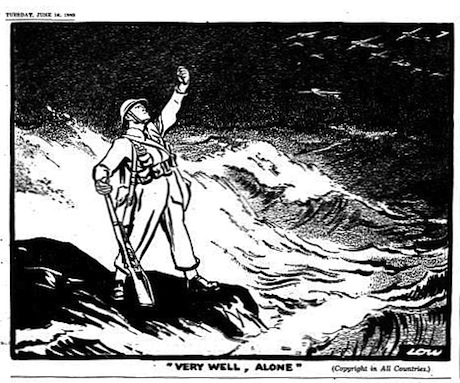Britain’s Obsession with the Second World War March 27, 2012
Author: Beach Combing | in : Actualite, Contemporary , trackbackAnyone who knows Britain will be aware of the constant references to the Second World War in the island’s political culture, particularly when national sovereignty is at stake. Harold Wilson decried appeals to ‘the Dunkirk Spirit’: and then shamelessly used the same trick himself. And the recent spats over Britain’s use of its ‘veto’ within the European Union inevitably brought up ‘peace in our time’, the ‘bulldog spirit’ (with accompanying images of Churchill) and David Low’s Very Well Alone cartoon!
All this is mildly irritating, because most of it is reflexive and lazy thinking. But far worse are those who decry Britain’s obsession with the Second World War as provincialism. Britain is, it is true, obsessed with the last war. But in this she is hardly different than France or Finland and most countries in between. Even the neutrals – Portugal, Ireland, Spain, Switzerland and Sweden – can hardly stop picking at the scab of what happened sixty odd years ago. The Second World War has become, in fact, for Europe what Homer was for the Greeks, a kind of Bible of identity in which we look for ourselves and each other and our relations to each other.
Of course, our reconstructions of the recent past are almost always shockingly inadequate. Certainly, the Second World War as remembered by Britain is full of myths. So Britain never, for example, fought ‘alone’. She was backed by the Dominions and the Empire (a mere fifth of the globe) who had plunged into the fire storm along with the mother country: New Zealand and Australia immediately, democratically and at great risk to their own territories. Britain’s claim that she was fighting ‘alone but not for Britain alone’ is sainthood after the fact. And Britain’s moments of WW2 glory from the Battle of Britain (the UK brilliantly fought Germany to a draw) to the Dambusters (a tragically underexploited stroke against the Reich) have almost all been artfully misconstrued.
Sometimes Beach wonders if Germany alone sees the Second World War in a rational light: drbeachcombing AT yahoo DOT com
But this is human nature and history will constantly be distorted by its creators. The sea captain might as well sue the sea as historians complain about such popular reimaginings. The fact is that Britain’s clingy, wallowing attitude to the Second World War is no better or worse than the attitudes of most other countries in this corner of the world. Those Britons who call the British obsession with WW2 ‘provincialism’ are either demanding a higher standard of behaviour from their country or, more likely, displaying their all too provincial ignorance of what happens in the rest of continent.
At least, in Britain the war is over and there is a consensus across the political spectrum as to what the war represented. In other countries (Ex-Yugoslavia, Austria…) the war is still being fought. Take Beach’s second home, Italy. There the right, particularly the post-Fascist right, continues to question the role of the partisans, particularly the communist partisans. While left-wingers still march to the music of the resistance: with ‘classics’ (most actually written several decade after hostilities ceased) such as Bella Ciao.
In much of Europe, the Second World War did not end in 1945: gunpowder and cordite were simply replaced by paper and podiums.
***
29 March 2012: KMH writes: Since the USA has engaged in politically difficult conflicts since WWII, (Korea, Vietnam, Iraq, Afghanistan) the war has receded from the public consciousness. The only ones left who participated in it are now approaching their nineties. If the British had suffered through another period of hostilities in the 70 odd years since WWII it might also have had the same effect. The economic recoveries of Japan and Germany (and perhaps also Italy) may have helped to redirect their political attention away from the war. And now China has entered into its economic boom era. Russia is still focusing on WWII perhaps because its communist leaders rejected help with economic recovery through the Marshall Plan. The large quantity of military aid to Russia in the war seems to have been forgotten about. To both forget and forgive can take quite a while, but without learning lessons from history we are bound to repeat it. Battles from the US Civil War are still being re-enacted – a reflection of the traumatic effect of this war on the American spirit. Thanks as always KMH!



